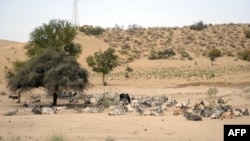The rates of malnutrition and disease in Pakistan's drought-affected regions are "alarmingly high," says Thomas Gurtner, head of the Pakistan office of the International Federation of Red Cross and Red Crescent Societies, or IFRC.
The risk for women and children is higher than that for men because men often find work in towns where there is wider access to food and clean water.
The woman and children the men leave behind are often forced to drink water from contaminated sites. Drinking the tainted water can cause vomiting, diarrhea and fever which can lead to malnutrition.
The Sindh and Balochistan provinces in southern Pakistan have felt much of the brunt of the drought.
An estimated five million people have been affected according to IFRC, which says the drought was caused by "unseasonably high temperatures and below average monsoonal rainfall."
Gurtner says the IFRC has given 315,000 Swiss francs to the Pakistan Red Crescent to help meet the needs of 15,000 of the most vulnerable people.





